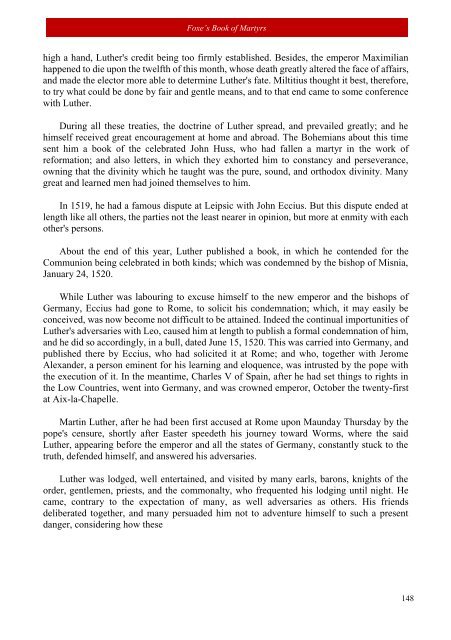Foxe - The Book of Martyrs
The mystery of history is not completely dark, since it is a veil which only partially conceals the creative activity and spiritual forces and the operation of spiritual laws. It is commonplace to say that the blood of the martyrs is the seed of the Church yet what we are asserting is simply that individual acts of spiritual decision bear social fruit …For the great cultural changes and historic revolutions that decide the fate of nations or the character of an age is the cumulative result of a number of spiritual decisions … the faith and insight, or the refusal and blindness, of individuals. No one can put his finger on the ultimate spiritual act that tilts the balance, and makes the external order of society assume a new form… Persecution, powerless to destroy or even to shake this new community, made it only the more sensible of its own strength, and pressed it into a more compact body.
The mystery of history is not completely dark, since it is a veil which only partially conceals the creative activity and spiritual forces and the operation of spiritual laws. It is commonplace to say that the blood of the martyrs is the seed of the Church yet what we are asserting is simply that individual acts of spiritual decision bear social fruit …For the great cultural changes and historic revolutions that decide the fate of nations or the character of an age is the cumulative result of a number of spiritual decisions … the faith and insight, or the refusal and blindness, of individuals. No one can put his finger on the ultimate spiritual act that tilts the balance, and makes the external order of society assume a new form… Persecution, powerless to destroy or even to shake this new community, made it only the more sensible of its own strength, and pressed it into a more compact body.
You also want an ePaper? Increase the reach of your titles
YUMPU automatically turns print PDFs into web optimized ePapers that Google loves.
<strong>Foxe</strong>’s <strong>Book</strong> <strong>of</strong> <strong>Martyrs</strong><br />
high a hand, Luther's credit being too firmly established. Besides, the emperor Maximilian<br />
happened to die upon the twelfth <strong>of</strong> this month, whose death greatly altered the face <strong>of</strong> affairs,<br />
and made the elector more able to determine Luther's fate. Miltitius thought it best, therefore,<br />
to try what could be done by fair and gentle means, and to that end came to some conference<br />
with Luther.<br />
During all these treaties, the doctrine <strong>of</strong> Luther spread, and prevailed greatly; and he<br />
himself received great encouragement at home and abroad. <strong>The</strong> Bohemians about this time<br />
sent him a book <strong>of</strong> the celebrated John Huss, who had fallen a martyr in the work <strong>of</strong><br />
reformation; and also letters, in which they exhorted him to constancy and perseverance,<br />
owning that the divinity which he taught was the pure, sound, and orthodox divinity. Many<br />
great and learned men had joined themselves to him.<br />
In 1519, he had a famous dispute at Leipsic with John Eccius. But this dispute ended at<br />
length like all others, the parties not the least nearer in opinion, but more at enmity with each<br />
other's persons.<br />
About the end <strong>of</strong> this year, Luther published a book, in which he contended for the<br />
Communion being celebrated in both kinds; which was condemned by the bishop <strong>of</strong> Misnia,<br />
January 24, 1520.<br />
While Luther was labouring to excuse himself to the new emperor and the bishops <strong>of</strong><br />
Germany, Eccius had gone to Rome, to solicit his condemnation; which, it may easily be<br />
conceived, was now become not difficult to be attained. Indeed the continual importunities <strong>of</strong><br />
Luther's adversaries with Leo, caused him at length to publish a formal condemnation <strong>of</strong> him,<br />
and he did so accordingly, in a bull, dated June 15, 1520. This was carried into Germany, and<br />
published there by Eccius, who had solicited it at Rome; and who, together with Jerome<br />
Alexander, a person eminent for his learning and eloquence, was intrusted by the pope with<br />
the execution <strong>of</strong> it. In the meantime, Charles V <strong>of</strong> Spain, after he had set things to rights in<br />
the Low Countries, went into Germany, and was crowned emperor, October the twenty-first<br />
at Aix-la-Chapelle.<br />
Martin Luther, after he had been first accused at Rome upon Maunday Thursday by the<br />
pope's censure, shortly after Easter speedeth his journey toward Worms, where the said<br />
Luther, appearing before the emperor and all the states <strong>of</strong> Germany, constantly stuck to the<br />
truth, defended himself, and answered his adversaries.<br />
Luther was lodged, well entertained, and visited by many earls, barons, knights <strong>of</strong> the<br />
order, gentlemen, priests, and the commonalty, who frequented his lodging until night. He<br />
came, contrary to the expectation <strong>of</strong> many, as well adversaries as others. His friends<br />
deliberated together, and many persuaded him not to adventure himself to such a present<br />
danger, considering how these<br />
148


















